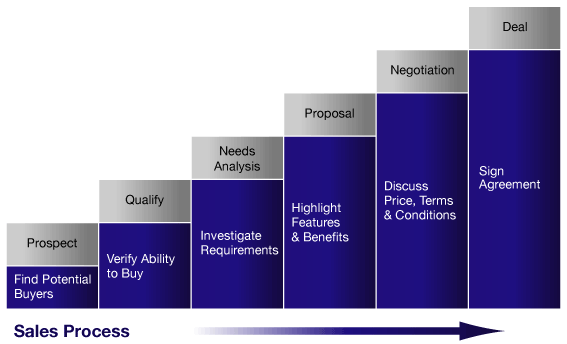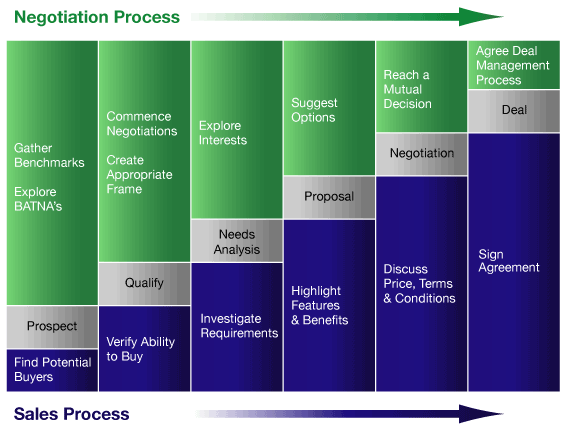| Persuasive Sales Negotiation (Part I of III) |  |
| Learn how your sales negotiation process and style can be enhanced through two of the principles of persuasion - Reciprocation and Consitency and Commitment. |
The sales process has become quite complex in the 21 st century. As a result of the information age, your average consumer is much more educated than ever before. Purchasing practices are now at their best, and have matured sigificantly. The competitive array of some industries is almost overwhelming whilst client organisations have grown larger, more global and intricate.
Some of the activities that sales professionals frequently perform in an average day include product knowledge, prospecting, cold calling, account plans, opportunity plans, tender responses, presentations, proposal writing, exhibition hosting, just to name a few.
If they are to succeed in today's business climate and be competitive at the same time, sales professionals must keep on top of the latest trends in sales and continualy improve their skills through ongoing sales training.
It is a widely held view that negotiation is a highly specialised manner of communication. It is likely that Most of us have undoubtably heard that a significant part of our communication derrives from our body language, facial expressions, and the quality of our voice. It is not only the words we speak (regardless of how carefully we chose these words). How can a sales professional be certain they are communicating at their best? How can we guarantee that our sales message is compelling, persuasive and will evolve into a profitable sale if we close the deal?
Negotiation and sales persuasion is no longer simply seen as an art as it has expanded into a science supported by over 50 years of research. In the following series of articles, we will examine in more detail the principles that comprise effective persuasion. Dr Robert Cialdini states that there are six principles of persuasion:
- Reciprocation
- Commitment and consistency
- Social proof
- Liking
- Authority
- Scarcity
This article examines at the first two principles.
The Principle of Reciprocation
The rule of reciprocation asserts that one person should try to repay on a equitable basis what we have received from another person. If somebody performs a favour for us, we should feel at least somewhat obliged to return their favour.
Dr Cialdini, who is considered a leading authority in the science of persuasion in many circles, makes an interesting observation about reciprocation. He states that a sense of obligation associated with reciprocation is so prevelant that Alvin Gouldner (1960) along with other sociologists reported that every human society has incorporated this rule.
How might we apply the principle of reciprocation to our advantage? The application will only work if it is genuinely offered. Dr Cialdini's research has revealed that if we are to gain any benefit from this principle, then we must be the ones that are the first to give. What we give must some relevant worth to the recipient. If we are able to provide a worthwhile advantage to them by our actions, then the priciple kicks into play because they will feel obligated to respond in kind.
If we can legitimately provide our prospective client with something that can add value to their personal career or circumstances, then the client will feel obliged to assist us in the furtherance of our career prospects and / or personal circumstances in return. More likely, this interaction implels the client to want to do business with us rather than our competitors.
Principle of Commitment and Consistency
The second principle of persuasion consists of commitment and consistency. Dr Cialdini describes commitment and consistency as our yearning to be (and to appear) consistent with what we have already performed. Once we make a decision, we will feel pressured from within and from the people with whom we interact to behave consistently with that commitment.
In his book, "Influence - Science and Practice", Dr Cialdini argues that if w are to comprehend why consistency is such a compelling motive, we must understand that, in most circumstances, consistency is cherished and adaptive. Inconsistency is generally viewed as an undesirable personality trait (Allgeier, Byrne, Brooks & Revnes, 1979; Asch, 1946).The person whose beliefs, words, and deeds are perceived as contradictory is perceived as confused, two-faced and even mentally ill. On the other hand, a high degree of consistency is normally affiliated with personal and intellectual strength. It is the cornerstone of logic, rationality, stability and honesty.
The manner in how we can apply this principle in our sales negotiation is to begin by getting agreements early on in the sales process. We can start by getting our prospective client to agree on the manner that they would like us to conduct the sales process. We can get them to agree on the benefits that they would receive from our product, service or solution, or we can simply start by getting agreement with our sales clients by simply giving them what they need. We should get their agreement that if we can solve their need and that they will respond by taking the kind of action that we desire. Once individuals start committing themselves to a particular process or manner of doing things, they will find it challenging to avoid acting consistently with their commitments.
Sales managers are becoming increasingly aware that managing the sales process is only a small factor of the many opportunities that will lead to a successful sale. It is also imperative to concentrate on how the company's value proposition is communicated at both an interpersonal and organisational level. The effectiveness of our sales can only gained by understanding the feedback from the prospective client. Only then can we effectively reach decisions around the impact of our sales strategy and processes. After all, how the success of our sales communications will be judged is the privilege of our clients, not ours.
Although this sounds obvious, it is often does not occur inside organisations where the sales process would be evaluated by events such as the submission of a proposal. Who can say whether the submission of a proposal has any value at all? A proposal could have been submitted to the wrong person or department for example. The proposal could have been irrelevant, or it might even have been an offensive. We can better judge where we are in the sales process by measuring the prospective client's responses to our actions.
Below, represented in Figure 1, is a chart of the generic sales process found in scores of organisations. This view is typically one dimensional and perceives negotiation as an event close to the end of the sales cycle.
Figure 2 represents The Negotiation Academy - Europe's holistic approach to deal making and melds the best practice in sales negotiation with the best practice in the sales process resulting in profitable deals that are solid. In this model, qualitative assessment is premised from a thorough understanding of the negotiation environment. Our model is built upon the recognition that negotiation is not a one time event during the sales process, but a process itself to enhance the sales process in every phase.
Figure 1 Traditional Generic Sales Process

Figure 2 Improved Generic Sales Process

In the next edition of The Negotiation Times we will further discuss the principles of persuasion and the steps we can take to deploy these in our sales environments.
Part I] [Part II] [Part II]Back to Negotiation Articles
We welcome the republication of this page's contents in part or full - we just ask that you include a clean link back to this site, to our www.negotiationtraining.com.au/training/ page.
|
Reader Comments
Average Reader Rating:
share your comment |
|
|
|






Reader Comments
Average Rating:
Total Comments: 1